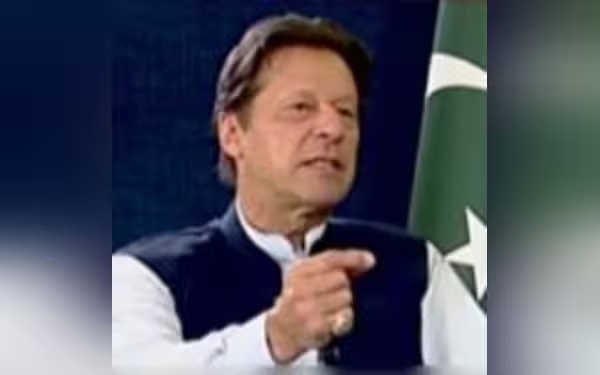Saturday, November 16, 2024 05:57 PM
Imran Khan Alleges Judicial Conspiracy in Pakistan's Political Landscape
- Imran Khan claims judiciary is part of a larger conspiracy.
- Khan warns of strong response if public meeting is denied.
- Current government described as a 'police state' by Khan.
 Image Credits: pakistantoday
Image Credits: pakistantodayImran Khan alleges a judicial conspiracy against PTI, warning of strong protests if denied public meeting.
In a recent development, Imran Khan, the founder of the Pakistan Tehreek-e-Insaf (PTI) party, has made serious allegations regarding the Supreme Court's judgment on reserved seats. Speaking from Adiala Jail in Rawalpindi, where he is currently incarcerated, Khan claimed that the detailed judgment has revealed the roles assigned to various individuals in the current political setup. He specifically pointed fingers at the Chief Election Commissioner (CEC) and the Chief Justice of Pakistan (CJP), labeling them as the "opening players" in what he described as a larger conspiracy.
Khan's comments come in the wake of the Supreme Court's ruling, which he believes is part of a broader strategy to undermine the PTI's position in the National and provincial assemblies. He stated, "It has now become crystal clear that Justice Isa is a part of the London Plan and that he deceived the nation." This statement reflects Khan's growing frustration with the judicial system, particularly regarding the handling of petitions related to the May 9 violence and the upcoming general elections.
During his informal discussions with journalists, Khan expressed his discontent with the judiciary's apparent inaction on PTI's petitions, saying, "None of our petitions is being heard and that has emerged as crystal clear now." He further alleged that there exists a "third empire" that supports the current regime, suggesting that the judiciary is being manipulated to serve political interests.
In a bold assertion, Khan warned that if his party is denied permission for a planned public meeting in Rawalpindi on September 28, they would respond strongly. He also announced upcoming protests aimed at advocating for judicial independence, indicating that the PTI is not backing down despite the challenges it faces.
Khan did not hold back in his criticism of the current government, led by the Pakistan Muslim League-Nawaz (PML-N). He described the current state of affairs as a "police state," claiming that conditions are even more oppressive than during previous military regimes. He stated, "This is a martial law which is far stricter than [former military rulers] Ziaul Haq and Pervez Musharraf’s martial law," highlighting his belief that the current government is stifling dissent and undermining democratic processes.
Moreover, Khan pointed out that some judges who dared to stand against what he termed a "gang" were removed from their positions. He accused the CJP of using the Practice and Procedure Act to maintain a form of dictatorship within the judiciary, effectively blocking the path for cases to be heard on their merits. This, he argues, is a direct violation of democratic principles.
As the political landscape in Pakistan continues to evolve, the implications of Khan's statements and the Supreme Court's rulings will likely resonate throughout the country. The PTI's struggle for political survival amidst these challenges raises critical questions about the future of democracy in Pakistan. Will the judiciary uphold its independence, or will it succumb to political pressures? Only time will tell, but one thing is certain: the political drama in Pakistan is far from over, and the stakes have never been higher.













